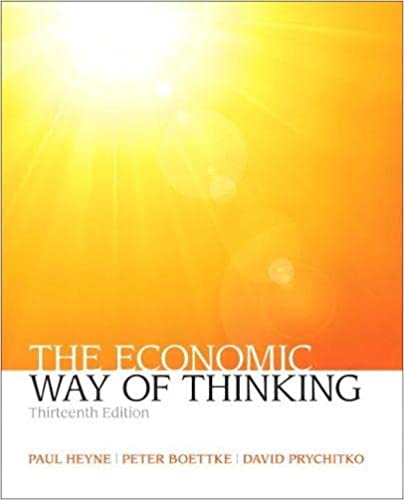
The Economic Way of Thinking 13th Edition by David Prychitko, Peter Boettke, Paul Heyne
Edition 13ISBN: 9780132992695
The Economic Way of Thinking 13th Edition by David Prychitko, Peter Boettke, Paul Heyne
Edition 13ISBN: 9780132992695 Exercise 10
Physicians who have borrowed extensively to finance their medical educations often enter practice with large debts that they must begin repaying.
(a) What differences would you expect to observe in the fees set by three young physicians just setting up practice if one financed his education by borrowing and must now make payments of $9,600 per year for 15 years, another had her entire education paid for by her parents, and the third went all the way through on government-provided scholarships and grants?
(b) Evaluate the argument, put forward by the business manager of a medical school, that the government could lower our doctor bills by paying for the entire education of physicians, thus making it unnecessary for physicians to recover the costs of their education (plus interest) by raising their fees.
(c) The author of the preceding argument asserted that "you and I" will have to cover the cost of the doctors' loan repayments in our fees because these payments "are a legitimate cost of doing business." What difference does it make whether particular payments are or are not "a legitimate cost of doing business?" Suppose all physicians practicing in an area had to pay $5,000 a year to the local crime syndicate as protection money. Would these payments be "a legitimate cost of doing business?" Would they affect doctors' fees?
(a) What differences would you expect to observe in the fees set by three young physicians just setting up practice if one financed his education by borrowing and must now make payments of $9,600 per year for 15 years, another had her entire education paid for by her parents, and the third went all the way through on government-provided scholarships and grants?
(b) Evaluate the argument, put forward by the business manager of a medical school, that the government could lower our doctor bills by paying for the entire education of physicians, thus making it unnecessary for physicians to recover the costs of their education (plus interest) by raising their fees.
(c) The author of the preceding argument asserted that "you and I" will have to cover the cost of the doctors' loan repayments in our fees because these payments "are a legitimate cost of doing business." What difference does it make whether particular payments are or are not "a legitimate cost of doing business?" Suppose all physicians practicing in an area had to pay $5,000 a year to the local crime syndicate as protection money. Would these payments be "a legitimate cost of doing business?" Would they affect doctors' fees?
Explanation
a.Although many physician have taken loa...
The Economic Way of Thinking 13th Edition by David Prychitko, Peter Boettke, Paul Heyne
Why don’t you like this exercise?
Other Minimum 8 character and maximum 255 character
Character 255


